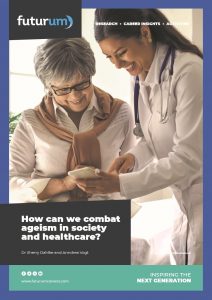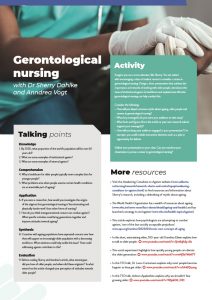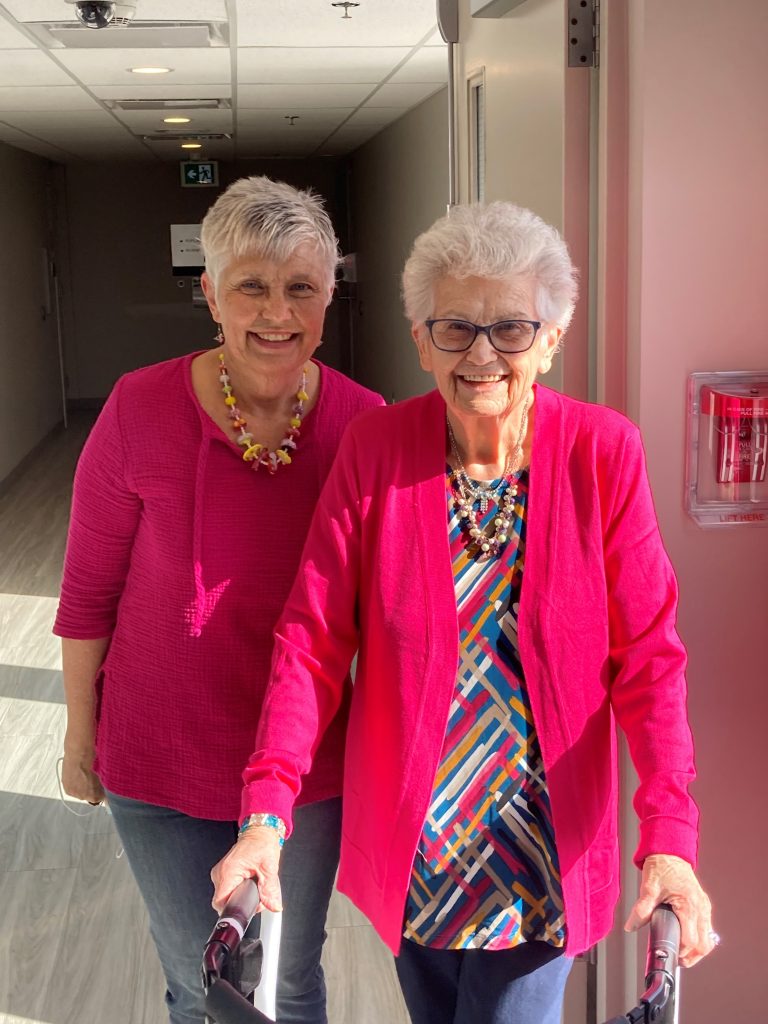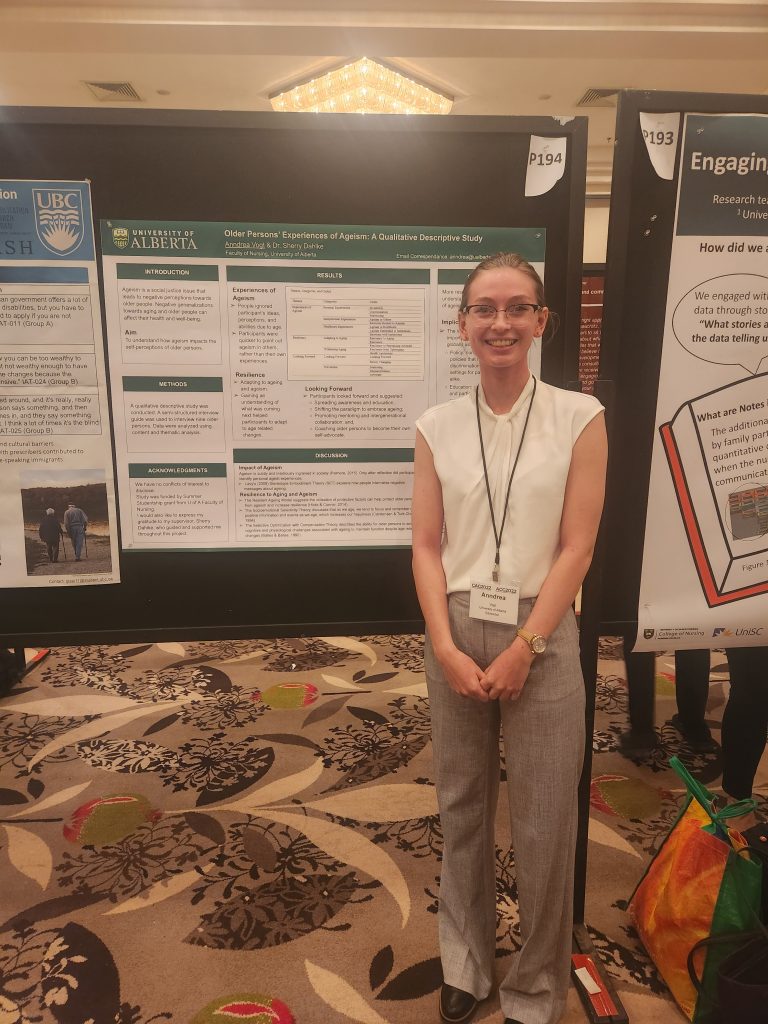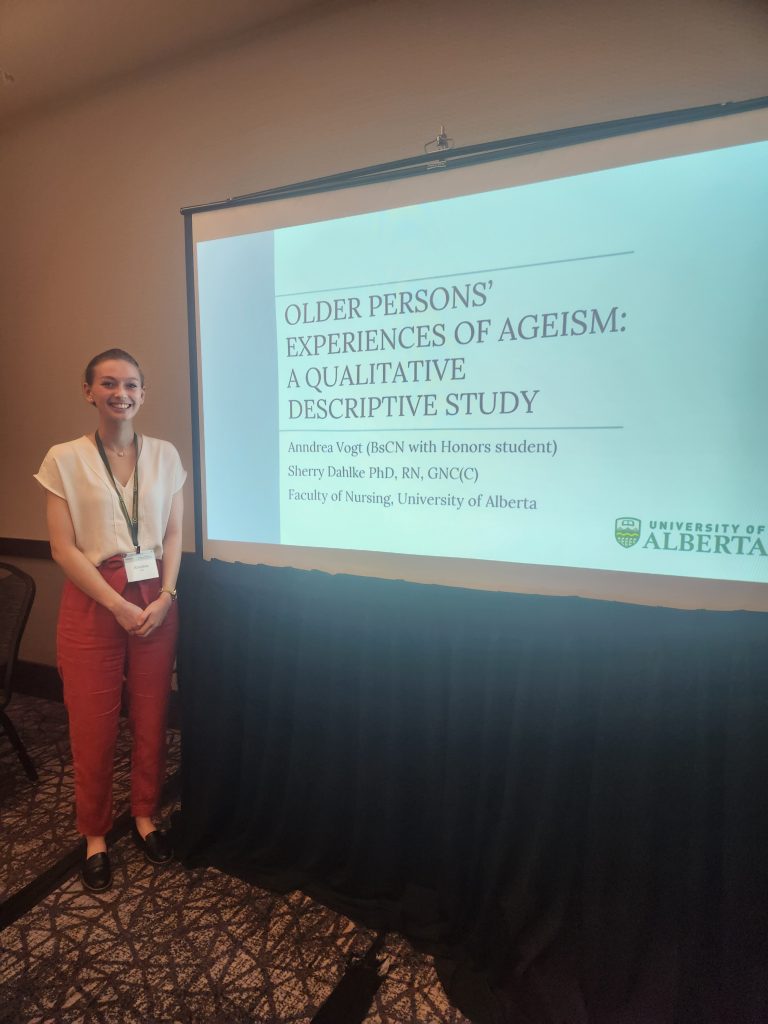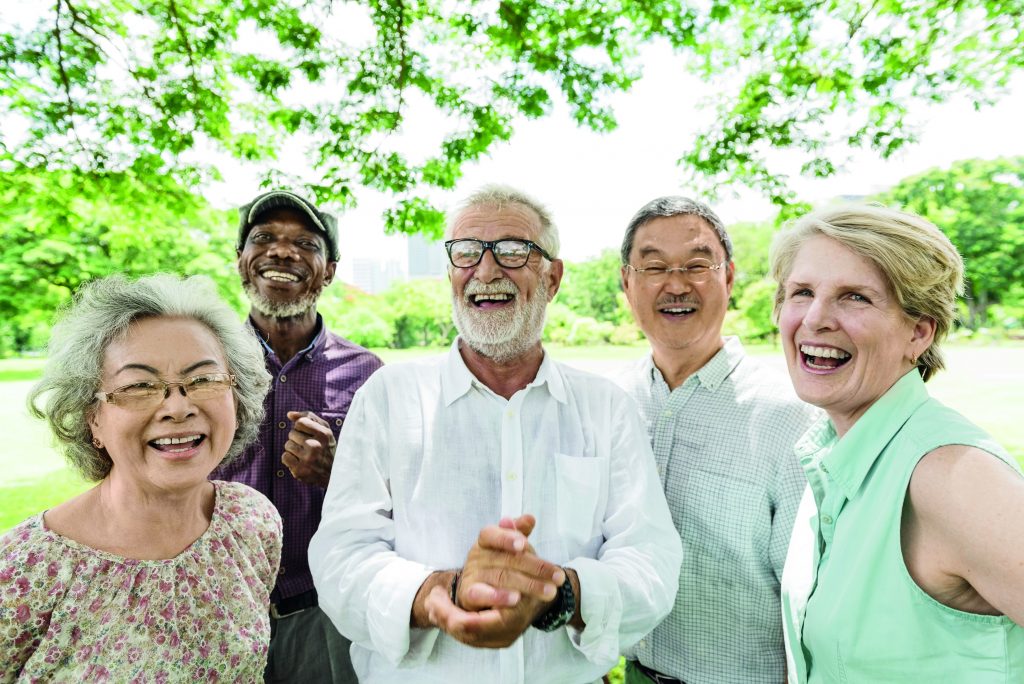How can we combat ageism in society and healthcare?
Whether we realise it or not, we all hold stereotypes about older people. Whether we view them as cute, forgetful, bad with technology or unproductive, these stereotypes are harmful to older people and ourselves. What is more, ageism in healthcare environments impacts the quality of care that older people receive. At the University of Alberta in Canada, Dr Sherry Dahlke and Anndrea Vogt are exploring the impacts of ageism on older people and developing educational resources to teach student nurses how to best care for older patients.
Talk like a gerontological nurse
Acute illness — a treatable short-term health condition
Ageism — prejudice or discrimination due to a person’s age
Chronic illness — a long-term health condition that can usually be controlled, but not cured
Dementia — a general term for conditions that impair a person’s ability to think, remember or make decisions, such as Alzheimer’s disease
Gerontological — related to ageing and older people
Palliative care — medical care that involves relieving a person’s symptoms rather than curing the illness, often used near the end of a person’s life
Social learning theory — the idea that social behaviour is learnt by observing and mimicking the behaviour of others
One of society’s less-visible prejudices is ageism: discrimination against older people. Stereotypes of older people may at first glance appear relatively harmless, but can, in fact, have far-reaching consequences. “When society holds negative views of ageing, we are all affected, because we are all ageing,” says Dr Sherry Dahlke, a nurse researcher at the University of Alberta. If we view older people as infirm, inactive and not involved in society, then when we grow old, we are more likely to accept these stereotypes about ourselves and limit our lives accordingly. These stereotypes also impact the quality of healthcare older people receive, which is why Sherry has developed educational modules to make student nurses aware of the impacts of ageism and to teach them how best to care for older patients.
Ageism in society
Ageist behaviours may be benevolent or hostile, and they are often unintentional. “Benevolent ageism involves over-accommodating an older person, for instance helping them across the street when they are capable of crossing by themselves,” explains Sherry. “Hostile ageism is overt discrimination, such as making negative comments about older people or excluding them from social activities.”
Ageism can be internalised by older people themselves. For instance, they may not seek treatment when experiencing mobility or memory issues, because they believe they are inevitable parts of getting older, when in fact their symptoms may be treatable. For example, while it is commonly believed that ageing causes a decline in cognitive abilities, this is usually a symptom of a specific health condition, such as a treatable acute illness (e.g., an infection) or dementia, rather than the ageing process itself. Viewing certain health conditions as a natural part of ageing is, therefore, a dangerous misconception, as not only are older people and their families less likely to seek treatment, but it can also lead to a lack of action from healthcare professionals.
Ageism in healthcare
“Institutional ageism is when society’s institutions are set up in a way that discriminates against older people,” says Sherry. Anndrea Vogt, a former student of Sherry’s, who has recently qualified as a nurse, has witnessed ageism first-hand within healthcare environments. “When taking an older person’s medical history, many nurses and doctors will ask questions to the accompanying family member rather than to the older person themself,” she says. “Hospital staff may describe an older person as a ‘cute little grandma’ which, while benevolent, is also demeaning.”
Such attitudes towards older people can directly affect the level of care they receive. “Most healthcare organisations, such as hospitals, are best equipped for caring for younger people with one acute illness,” says Sherry. “As we grow older, we are more likely to accumulate chronic illnesses and may be on multiple medications. This can make older people’s care more complex.” Moreover, staff are often trained to recognise the symptoms of illnesses only when they occur in younger people, while older people may show different symptoms when affected by the same illness. “For example, if an older person is confused, healthcare professionals may think they have dementia,” says Sherry. “However, the confusion may be caused by an infection or a new medication.”
There is also a widespread belief in healthcare that caring for older people is less interesting and physically harder work than caring for younger people. “In my first year at nursing school, the stigma around working with older people meant I was initially influenced against working in this field,” says Anndrea. “The nurses in my family told me that working with older people is unrewarding, and instructors in the hospital told us that it is the ‘easiest form of nursing’, suggesting it doesn’t provide any intellectual or professional challenge.” Now, Anndrea firmly believes the opposite is true. “It is so rewarding to work with older people because they have so much life experience and gerontological care presents unique challenges,” she says. The complex conditions that may be presented by older people call for well-trained and dedicated professional healthcare providers.
Learning by example
Social learning theory suggests that how we learn is influenced by how people act around us. This can have a significant impact on how we perceive age and ageing. “Based on our research into the impacts of ageism, we found that many people learnt how to overcome internal ageism based on their observations of how family and friends grew older,” says Anndrea. “For example, if someone had seen their grandparents successfully navigate mobility issues, they remembered their successes when they faced the same age-related challenges themselves.”
Reference
https://doi.org/10.33424/FUTURUM427
Anndrea presents her research about older people’s experiences of ageism at a conference
Anndrea discusses the results of her research into older people’s experiences of ageism
It is important to realise that everyone’s experiences of ageing are different, and that stereotypes of older people are harmful to everyone in society
© Rawpixel.com / Shutterstock.com
On the other hand, if people do not have these positive experiences, Sherry and Anndrea discovered it is difficult to learn resilience – especially if they are constantly exposed to ageism. “If older people are consistently perceived as weak, mentally declining and a burden to society, then they will subconsciously begin to believe these things about themselves,” says Anndrea.
Improving nursing education to improve gerontological care
Sherry believes these findings indicate a strong need to confront ageist prejudices to make healthcare more effective. “We need to present accurate information about ageing and demonstrate a more positive way of managing care for older people,” she says. “To address this, I have developed educational modules for student nurses that incorporate case studies of good practice with older people.” These modules help nurses build a richer understanding of the conditions that typically affect older people and how they present themselves. “We cover how to communicate with older people as sensory changes take place, and how to understand and account for cognitive impairments. For instance, people with dementia might be unable to verbally articulate that they are hungry or need the bathroom, so nurses must be able to understand how other behaviours might communicate these needs.”
The modules also address challenges around and attitudes towards mobility, pain management and palliative care. The course ends with a module on leadership, which teaches student nurses how to be a clinical leader by championing fair and equitable treatment of older people. “The modules are all evidence-based and include videos, interactive elements and real-world scenarios to help student nurses understand best nursing practices,” says Sherry.
Looking ahead
Sherry hopes her teaching modules will be adopted by other nursing degree programmes, helping to address ageism within healthcare. “Most people are unconscious of the bias they hold against older people,” she says. “It can start very young – even the books we read to children may portray older people as less capable.” She believes intergenerational contact provides a key opportunity for older people to share their wisdom with the younger generation. “I agree that the most effective way to change negative stereotypes about ageing is to increase awareness of ageism,” says Anndrea. “Most people do not even realise what ageism is, let alone how it is embedded in society. If more people understand its effects, we can make progress on ways to eliminate it.”
To conduct her research into the impacts of ageism, Sherry worked with age-related organisations, gerontological experts and older people themselves. With their help, she is now disseminating her findings to nurses and the public, to improve institutional and societal attitudes towards ageing. Looking ahead, Sherry plans to begin another research project that develops intergenerational learning activities, pairing student nurses with older people in the community to challenge negative stereotypes of ageing and build appreciation for the older generations.
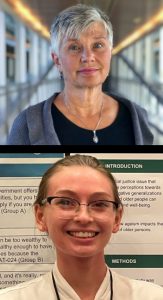 Dr Sherry Dahlke
Dr Sherry Dahlke
Anndrea Vogt
Faculty of Nursing, University of Alberta, Canada
Field of research: Gerontological Nursing
Research project: Developing a training programme to raise awareness of ageism among student nurses and improve their skills in caring for older people
Funder: Social Sciences and Humanities Research Council of Canada
About gerontological nursing
Gerontological nurses care specifically for older people. They focus on improving patients’ quality of life by providing clinical care and tending to other aspects of their well-being. “Gerontological nurses look at older people holistically,” says Sherry. “They must often investigate whether functional changes in a person are due to illness or general ageing. While many chronic illnesses, such as dementia and heart disease, are more likely to occur in older people, they are not inevitable with ageing, and it is important to understand that we all age differently.”
Caring for an ageing population
As global development and improved healthcare raise life expectancies around the world, the global population is ageing. According to the World Health Organization, by 2030, 1 in every 6 people in the world will be over 60 years old. “This is significant because we need to have the resources to care for older generations appropriately,” says Anndrea. “However, there is a growing disconnect between generations, and younger people are becoming less enthusiastic about caring for the people who raised us. I think more intergenerational contact can heal this and allow for the next generation to better care for the growing population of older people.”
Gerontological nurses may work in a wide variety of settings. Many of them work in hospitals, as most hospitals see large numbers of older patients. They also work in long-term care and palliative care facilities, where they address the healthcare needs of residents. Gerontological nurses play a key role in caring for older people in their own homes. This is hugely important, as many older people may need some healthcare assistance, such as help changing dressings or taking medications, without needing to be in hospital. Home-care nurses, therefore, enable older people to continue living independent lives in their community.
The joys of gerontological nursing
Anndrea says that gerontological nursing brings many rewards. “I enjoy listening to and learning from every single person that I care for,” she says. While some people may think providing end-of-life care would be depressing, Anndrea finds it incredibly meaningful and rewarding. “I enjoy this aspect of nursing as I can be the person who makes such a difference to the well-being of the patient and their family at the end of their life.”
Pathway from school to gerontological nursing
• Sherry and Anndrea recommend studying science subjects in high school and post-16, especially biology and chemistry, as the knowledge you learn in these classes will be important in your nursing degree.
• “I highly recommend shadowing a nurse while at high school,” says Anndrea. “This is the best way to find out if the career is right for you.”
• Many colleges and universities offer degrees in nursing. Depending on where you want to study and work, you may also be able to qualify as a nurse without attending university. Nursing apprenticeships and practical training programmes can provide an alternative pathway to a career in nursing, while care worker roles in long-term residential facilities for older people often do not require nursing qualifications.
• Other health or healthcare related degrees could also lead to a career working with older people, such as medicine, public health or psychology.
Explore careers in gerontological nursing
• “There is such diversity in what you can do as a gerontological nurse,” says Sherry. “You can work with patients in hospital, in the community or in long-term care facilities, or you could become a researcher, like me.”
• Whatever aspect of gerontological nursing you choose, it is important that you have patience and compassion when working with older people. Critical thinking and the ability to think outside the box are also necessary when dealing with the complex healthcare needs that older people may have.
• Sherry suggests looking for gerontological associations in your area, such as the Canadian Gerontological Nurses Association (www.cgna.net) and the Alberta Gerontological Nurses Association (www.agna.ca). Many such organisations provide resources about gerontological nursing and arrange meetings you can ask to attend.
Meet Sherry
At the age of 65, my grandfather could jump a six-foot fence! He was always fit and positive-minded and lived to be almost 100. He deeply impacted how I think about the ageing process.
I spent many years working as a clinical nurse, where I enjoyed meeting a diverse range of people. It was rewarding to help them, whether through relieving their pain, assisting them moving or simply listening to their concerns. A typical day involved assessing patients’ physical and mental well-being, administering medication, changing dressings and helping them attend to their daily activities, such as washing, mobilising and administering medical treatments.
Once, while working as the manager of a hospital surgical unit, a young nurse came and told me there were too many old people on our floor. This comment shocked me. It made me consider how we could better care for older people and prompted me to return to university to study for a master’s degree, then a PhD. Now, I conduct research focused on improving nursing practice with older people.
When I was younger, I wanted to improve people’s lives, so thought I’d either like to work in teaching or nursing. Now, I get to do both! As a teacher, I love interacting with student nurses to engage them in learning. As a nursing researcher, I love having the freedom to decide what I want to study. Every day is different.
I hope we can start addressing ageism and reframing older people as an essential and valuable part of society. Through my research, I want to equip student nurses with knowledge and positive perspectives of older people, so they then go on to disrupt the negative care practices that result from ageism.
In my free time, I love playing golf. I also enjoy riding my bike, doing yoga and attending music events.
Meet Anndrea
I have always been interested in medicine and originally wanted to be a doctor, so before entering university, I spent time shadowing a physician at my local hospital. I decided to study nursing as I thought it would be the quickest way to gain hospital experience, rather than taking the longer, traditional route to get into medical school. However, that part of my plan didn’t work out because I fell in love with nursing!
There have been numerous times in my life when obstacles have forced me onto a different path from the one I anticipated. However, I am so glad they did, because these obstacles guided me to where I am today. I believe it is important to trust in the process, and everything will then work out.
I helped to create the educational module that teaches student nurses about responsive behaviours – the actions people with dementia might use to express their frustration or confusion. I also conducted my own research to understand how ageism impacts older people. For my honours project with Dr Dahlke, I interviewed older participants about their perceptions of age and ageing, then analysed their answers to find common themes and ideas that explained the impacts of ageism on older people.
My favourite thing about gerontological nursing is hearing people’s stories. It was great to interview older people and hear about their experiences. It was also incredibly motivating and powerful to hear how older people have overcome stigmas and stereotypes throughout their lives, and it was inspiring to discuss how we can combat ageism in society.
I have recently graduated with my nursing degree, and I am currently working as a labour and delivery nurse where I help care for mothers and babies during childbirth. I hope to gain a few more years of experience in obstetrics (the branch of medicine concerned with childbirth) before returning to university for a master’s degree and PhD. I would like to study the connections between obstetrical and gerontological nursing as I think there is such an interesting commonality between the beginning and end of life. Joy and grief can often be found in both, and I think that studying the similarities in caring for these specific populations could help us learn more about effective care.
When I’m not working, I love to explore. My fiancé and I often go canoeing, hiking and camping in the mountains.
Do you have a question for Sherry or Anndrea?
Write it in the comments box below and Sherry or Anndrea will get back to you. (Remember, researchers are very busy people, so you may have to wait a few days.)

